- Home
- Jim Eldridge
The Invisible Assassin Page 10
The Invisible Assassin Read online
Page 10
The short wiry man hesitated.
He’s thinking about it, thought Jake. And if they do let me go back inside the building to get the book, I’ll find somewhere to hide and then get out another way. Providing Adam and Gareth aren’t waiting for me, of course.
‘OK,’ said the short man. ‘Phone your pal in the office and get him to bring it out.’
Jake stared back at him, dumb-struck.
‘What?’ he asked.
‘You heard,’ said the man. ‘Take out your phone and call him. Tell him to bring the book out.’
‘I don’t have a pal in the office,’ said Jake desperately.
‘Yes, you do,’ said the man. ‘His name’s Evans. Paul Evans.’
How do they know that? thought Jake. ‘I don’t know his number,’ he flailed.
The short man gave a snort of disbelief.
‘Oh, come on!’ he sneered.
‘I don’t!’ protested Jake. ‘I never call him on the phone! He sits next to me!’
‘He’s faking,’ said the man behind him. ‘Wasting our time. I’ll shoot him.’
‘No!’ blurted out Jake desperately. What could he do? He didn’t have the book. Parsons had the book. Or, he had had the book. He could have put it somewhere safe by now. He gulped. ‘I don’t have his extension number on my mobile,’ he said.
‘That’s no problem,’ said the short man. ‘Phone the main switchboard and give them his name. They’ll put you through.’
Jake hesitated, looking about him. He was trapped. Everything else was going on normally around him: people coming in and out of the sandwich bar; traffic passing by; people going about their daily business, and in the centre of it, Jake was trapped between two SAS black ops soldiers with a silenced gun aimed at him. These men would have no pity for him, no sympathy. They were here to do a job: get the book off him. And they’d get it, even if it meant tearing out his fingernails, breaking his arms and legs, electrocuting him and burning him. They wanted the book.
With trembling fingers, he pulled out his mobile. He looked at it, then gulped. ‘It’s low on charge.’
‘No problem,’ said the short man. He reached into his pocket and pulled out a mobile phone. ‘This one is fully charged.’ He handed it to Jake, his face set in a grim expression. ‘Dial,’ he said firmly.
Jake gulped. He tapped in the first digit, and then suddenly threw the mobile into the doorway of a nearby shop, and at the same time ran out into the road, hurling himself in front of a car.
The car slammed on its brakes, tyres squealing in protest, and there was the horrifying sound of metal crashing into metal as the car following behind ran into the back of it; then the car behind that running into the back of the second car.
Horns blared, and the door of the first car was thrust open. A middle-aged man got out, his face twisted in fury. He reached out and grabbed hold of Jake by his jacket with both hands and began to bang him against the bonnet of the car.
‘My no-claims bonus!’ he roared, and then began punching Jake.
‘Sorry! Sorry!’ burbled Jake, putting up his arms in front of him, doing his best to defend himself.
Other people had arrived on the scene now: passers-by, tourists, drivers from some of the other cars that had pulled up on the roundabout, and the figure of a policeman.
‘Stop that!’ ordered the policeman, and the angry man reluctantly stopped punching Jake.
Jake shot a glance towards the pavement. The short wiry man had disappeared. He guessed his accomplice had also gone, but only for the moment. He was sure they were somewhere near, watching, and they’d be back.
Chapter 17
Jake sat on the hard wooden chair in the interview room at the police station. He’d just given his statement to the uniformed police constable about what had happened: being threatened by the two men, and running into the road to escape them. It was obvious to Jake that the constable hadn’t wanted to come all the way back to the station and take his statement. The constable had hoped this would be just a simple matter, with Jake being cautioned (or possibly charged) for causing an accident at the scene. One crime committed, one crime solved. A box ticked. 100% crime-solving success rate.
Instead of which, Jake had insisted he’d been the victim of a potentially deadly assault, and equally firmly insisted on being taken to the nearest police station to give his statement.
From Jake’s point of view, it had been a strategy to ensure he was protected. The two men would keep away from him as long as he was in the company of the constable.
The constable read through Jake’s statement, then slid it across the table for Jake to sign. As Jake put his autograph at the bottom, the constable added gravely, ‘There may be charges against you in respect of the collisions, sir.’
Jake slid the statement back across the table.
‘These are the men responsible,’ he said, pointing to his statement.
‘You’ve only given us a description of one man,’ the constable pointed out.
‘Because I didn’t see the other one,’ said Jake. ‘He was the one holding a gun on me.’
‘Yes, sir,’ said the constable, not really bothering to hide the note of scepticism in his voice. He read aloud from Jake’s statement. ‘A short man. About five feet six inches tall. Almost shaven head. Wiry, but with a muscular build. Scar running down the left side of his face from his eye to the corner of his mouth. Dressed in a casual brown zip-up jacket over a black T-shirt. Also wore jeans and trainers.’ He looked at Jake.
‘Yes.’ Jake nodded. ‘That was him. The scar makes him very distinctive.’ Still playing for time, determined to remain in the safety of the police station for as long as he could, he added, ‘If you like, I could go through those book things. The ones with photographs of known criminals, see if I can spot him. I’ve seen them do that on TV.’
‘Yes, well, it’s not that easy, sir,’ said the constable. ‘Everything’s computerised these days.’
‘I can look at them on a computer,’ offered Jake.
The constable stopped short of uttering a heavy sigh. Instead, he said, ‘Thank you, sir. I shall contact the ID Department and see if that can be arranged, although it may take a day or two. We’ll contact you and make an appointment for you to come in.’
No, you won’t, thought Jake. As soon as I’ve gone, you’re just going to file this statement away and hope I forget about it.
The constable stood up.
‘Well, sir, if there’s nothing more . . .’
No, there isn’t, thought Jake ruefully. I have to go out there and hope the pair aren’t waiting for me.
‘Can I call a taxi from here?’ he asked.
‘I’m afraid our phones are only for official use,’ countered the constable.
‘No, I meant, can I call one and wait here for it to arrive?’
The constable studied Jake. He was obviously keen to see the back of him as soon as he could.
‘By all means you can wait in the reception area, sir,’ he said.
‘Thanks,’ said Jake.
The constable took him out to the reception area, and he called a cab company he used on an irregular basis. But at least it was one he knew was safe, and he could trust. The cab company assured him they’d pick him up from the police station in fifteen minutes, and he settled himself down in the reception area to wait. He tried phoning Lauren again, both on her landline and her mobile, but each time he got her voicemail. He left the same message both times.
‘Lauren, we need to talk. It’s urgent. Please ring me.’
As he hung up, he felt worse than ever. Then an awful thought hit him: if the pair of thugs had already been on to him, had others already gone after Lauren? Was that why she wasn’t answering her phone?
I have to go round to her flat, he thought. I have to know she’s all right. I have to warn her!
A short Asian man came into the station. ‘Taxi for Wells?’ he said.
‘Here,’ said Jake, getting up.
He followed the man out and climbed into the taxi, his eyes swivelling as he did so, looking out for any sign of the two men watching him, waiting. He didn’t see them, but then, if they were professionals, they’d be sure to be keeping out of sight.
As the taxi made its way through the snarled-up traffic towards north London, Jake tried Lauren’s numbers again; but again, there was no answer.
As soon as I get back to my flat, I’ll pack a few things in a bag, just in case I have to hide out for a few days, and then go straight to Lauren’s and hope she’s in.
The taxi pulled up outside his flat. Still nervous, Jake looked around him as he paid the driver, and then hurried to the entrance to the block. No one around, so far.
He used the stairs to get to the first floor, and his flat, rather than risk the lift. At least on the stairs he could see people coming.
There was no one about on his landing. Warily, he checked his front door for any signs that the lock had been forced, but everything seemed normal. Well, as normal as they could be in this nightmare situation.
What’s happening? thought Jake desperately. Why is that book so important? And how did those two guys know that it was me who took it?
He unlocked the door of his flat and stepped in, and then stopped. There was something not right, but he couldn’t put his finger on it. He hesitated, then shut the front door, just in case anyone was lurking outside on the landing, waiting to follow him inside.
He stood in his small hallway, listening, but there were no sounds other than the usual: the hum of the fridge, the traffic noises outside filtered and muffled by his windows. He sniffed. There was a smell that was different. What was it? Not tobacco. No, a sort of rusty smell. Faint, but there.
Apprehensively, he moved towards his kitchen, and suddenly darted past the doorway, glancing in as he did so. His kitchen was empty; he saw that at a glance. It was so tiny there was no room for anyone to hide in it. They wouldn’t even have been able to squeeze into any of the kitchen cupboards.
The bathroom was next. The door was shut. Carefully, he pushed the handle down, and then banged the door open, at the same time leaping to one side in case anyone was in there with a gun aimed at the doorway.
There were no shots. No movement or sound at all from the bathroom.
His bedroom was next. The door was half open. Had he left it half open before he went out, or had he closed it? He couldn’t remember. He stood outside the room, listening. If anyone was in there, he should be able to hear them breathing. He waited, tense, listening, ears strained. No sound from within the bedroom.
He pushed the bedroom door open and waited, hanging back in the hallway. No gun went off. No one leapt out. Nothing.
I’m getting paranoid, thought Jake. It’s just me in the flat. But then he smelt that rusty smell in his nostrils again and thought: but someone’s been in here since I went out this morning. And maybe they still are. But where are they? Or maybe the rusty smell was to do with something else: a leaking radiator, maybe. It was quite likely he was being over-sensitive about things, that his imagination was running away with him.
Cautiously, he moved towards his living room. The last room in his flat. If there was anyone here, lying in wait for him, this was where they’d be. The living-room door was just slightly ajar. Frantically, he searched his memory: had he closed it like that before he left for work that morning? Or was someone in there, waiting, poised to pounce as soon as he walked in? He thought he’d left the door open, but he couldn’t remember.
He fought to keep down the panic that was rising up inside him.
I shouldn’t have come back here, he said to himself. I should have gone to Lauren’s first. If she was OK, I should have got her or Parsons to come back here with me. There’s less chance of being attacked if I had someone with me.
But right now, he was on his own, vulnerable.
Maybe I should just back out, he thought. I’ve got this far. Maybe I should retreat to the front door and slip out.
You’re overdoing it, he told himself. There’s no one here. If there was, they would have been at you by now. They wouldn’t have waited this long.
Come on, he urged himself. Open the door and walk in. There’s no one there. You’re OK. Get in, grab your stuff, and get out.
He hesitated, took a deep breath, then pushed open the door.
There was a body on the floor of his living room. Not just any body, it was the short man who’d stopped him in the street and threatened him. The same black T-shirt, the same short hair, the same scar down one side of his face, only now his eyes were wide open and he was perfectly still, and there was a knife sticking out of his chest.
Jake felt sick. He swayed. Who was this man? How had he got here? Who had killed him? And why?
‘I have to phone the police,’ he said aloud.
Suddenly, there was a crash from outside his flat, and as he turned he saw the front door being torn off its hinges and hurtling in, and then his flat was filled with men dressed from head to toe in black and holding automatic rifles.
‘Face down on the floor!’ screamed the man nearest to Jake.
‘But . . .’ he began.
‘On the floor!’ roared the man. ‘Hands on your head!’
Jake dropped to the floor and pressed his face into the carpet, his hands behind his head, as instructed. All he could see were big boots crashing around him, and then a shout came from one of the men.
‘Dead, all right! Stabbed!’
Jake started to get up, to explain, but a boot stamped down on the back of his neck, pushing his face back into the carpet.
‘Move again and you’re dead!’
Chapter 18
Jake sat in the cell. It was a bare box, with one small window made of wired glass high up in one wall. What was the point of the wired glass? he wondered. The window was about ten feet from the floor, with no way of reaching it, short of being a human fly or Spiderman and climbing up the wall. Maybe it was to stop the prisoners inside the cell from trying to break the glass; but the police sergeant had taken anything hard from Jake: his keys, money. They’d also taken his shoelaces and his tie.
Everything in the cell was fixed down. The metal toilet bowl in one corner. The bench on which he was sitting, and would be sleeping on if they didn’t let him out, was a slab of concrete set into the wall. There was a very thin mattress on the concrete slab, but there was no way he could throw the mattress at the window and do any damage to it.
He sat on the mattress on the bench. He’d been here for hours. He didn’t know exactly how long because the police had also taken his watch and his mobile. What was it that Albert Einstein had said about time being relative? That sometimes an hour can seem like a day, and sometimes it seems little more than a few seconds. He tried to work out how long he’d been in here. He’d been brought in at about one o’clock. The daylight coming in through the tiny window was still strong, so it was still the afternoon. Why were they leaving him for so long? To soften him up? Frighten him? They’d already done that.
He rubbed the back of his neck. It still ached from where the armed man in black had put his foot on it. He shivered as he remembered the black-clad men with the guns in his flat. Then the plain-clothes people had appeared: a man and a woman. They’d taken one look at Jake, lying on the floor, and at the body of the man in the living room, and then gestured at Jake and said, ‘Bring him along.’ After that, they’d stripped him of his possessions, and anything they thought he might use to harm himself, and had locked him in this cell.
They think I killed that man, he told himself, and a surge of fear went through him. They’ll put me on trial and fix it so I’m found guilty and spend the rest of my life in jail. And all because I saw a man turn into a vegetable! he groaned.
There was the sound of a key in the lock, and then the door swung open. A burly uniformed constable looked in at him.
‘All right, you,’ he said. ‘Someone wants to talk to you.’
‘Interview with Jacob Matthew Wells. Detective Inspector Edgar and Sergeant Club attending. PC Omulu also present.’
Jake sat at the bare table, looking across at the man who’d spoken into the recording device, Detective Inspector Edgar. Next to him was Sergeant Club. Jake presumed that the uniformed constable sitting on the rickety chair by the door was PC Omulu.
This room was very different from the interview room in the other police station, where he’d given his statement about being attacked. That room had seemed almost friendly, its walls painted a pastel shade of yellow. This room seemed threatening. The only furniture was the table and a couple of chairs. It smelt musty: stale sweat. The walls were dark. Jake could imagine people being tortured in here with no one coming to help them.
There were no windows, just lights set into the ceiling, their bulbs protected by wire mesh, just like the bulbs in the cell. Jake assumed this was to protect them against people suddenly standing up and throwing a chair at them. He guessed that the table was fixed to the floor. He was tempted to see if it moved and test his theory, but the very grim expression on the face of the detective inspector sitting opposite him told him that would not be a good idea.
‘Do you know the dead man?’ asked Edgar.
‘No,’ said Jake.
‘But you had seen him before?’
Jake hesitated, then he answered: ‘Yes.’
Edgar nodded. He consulted his notes and said, ‘You were involved in an incident earlier today at the roundabout by Marsham Street. You gave a statement in which you said you had been the victim of an attempted mugging. Is that right?’
They know, thought Jake.
‘Yes,’ he said, numbly.

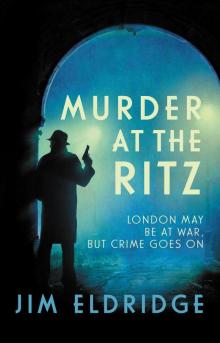 Murder at the Ritz
Murder at the Ritz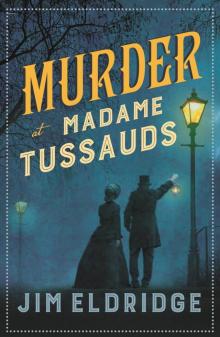 Murder at Madame Tussauds
Murder at Madame Tussauds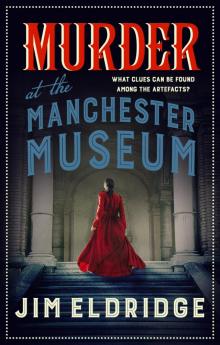 Murder at the Manchester Museum
Murder at the Manchester Museum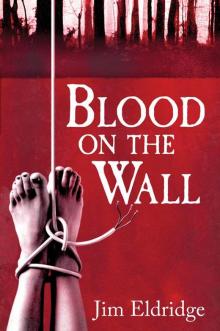 Blood On the Wall
Blood On the Wall 4.3.2.1
4.3.2.1 Jungle Kill (Black Ops)
Jungle Kill (Black Ops)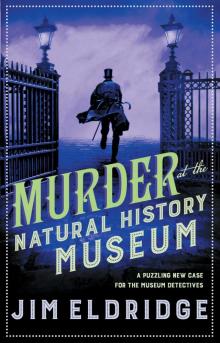 Murder at the Natural History Museum
Murder at the Natural History Museum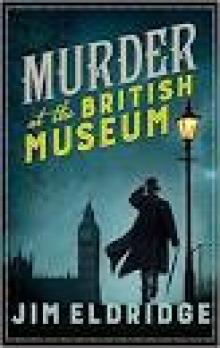 Murder at the British Museum
Murder at the British Museum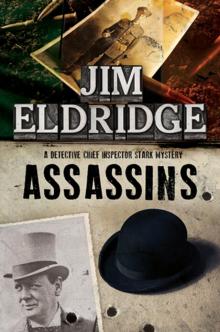 Assassins
Assassins Hunk and Thud
Hunk and Thud Roman Invasion
Roman Invasion Big Rock and the Masked Avenger
Big Rock and the Masked Avenger The Last Enemy
The Last Enemy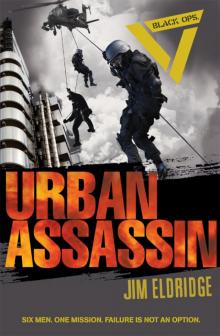 Urban Assassin
Urban Assassin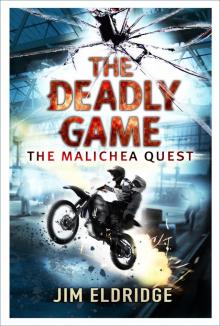 The Deadly Game
The Deadly Game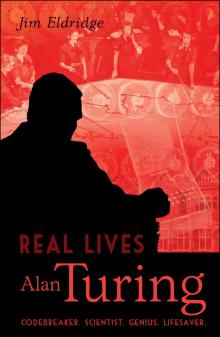 Alan Turing
Alan Turing The Lethal Target
The Lethal Target The Giant Rumble
The Giant Rumble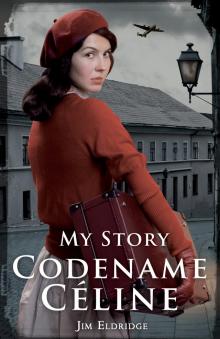 Codename Céline
Codename Céline Death in the Desert
Death in the Desert Escape from Pompeii
Escape from Pompeii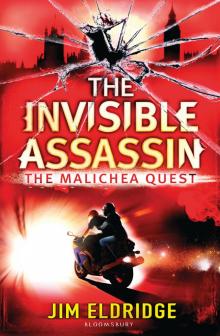 The Invisible Assassin
The Invisible Assassin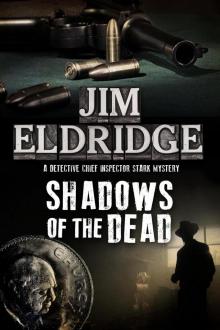 Shadows of the Dead
Shadows of the Dead Jack Versus Veto
Jack Versus Veto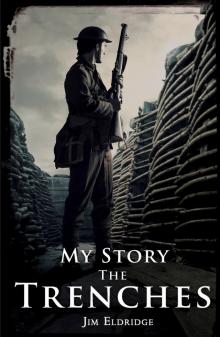 The Trenches
The Trenches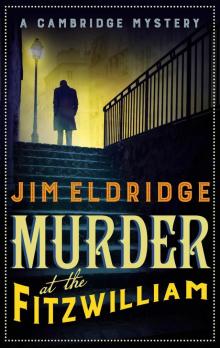 Murder at the Fitzwilliam
Murder at the Fitzwilliam Coming Home
Coming Home